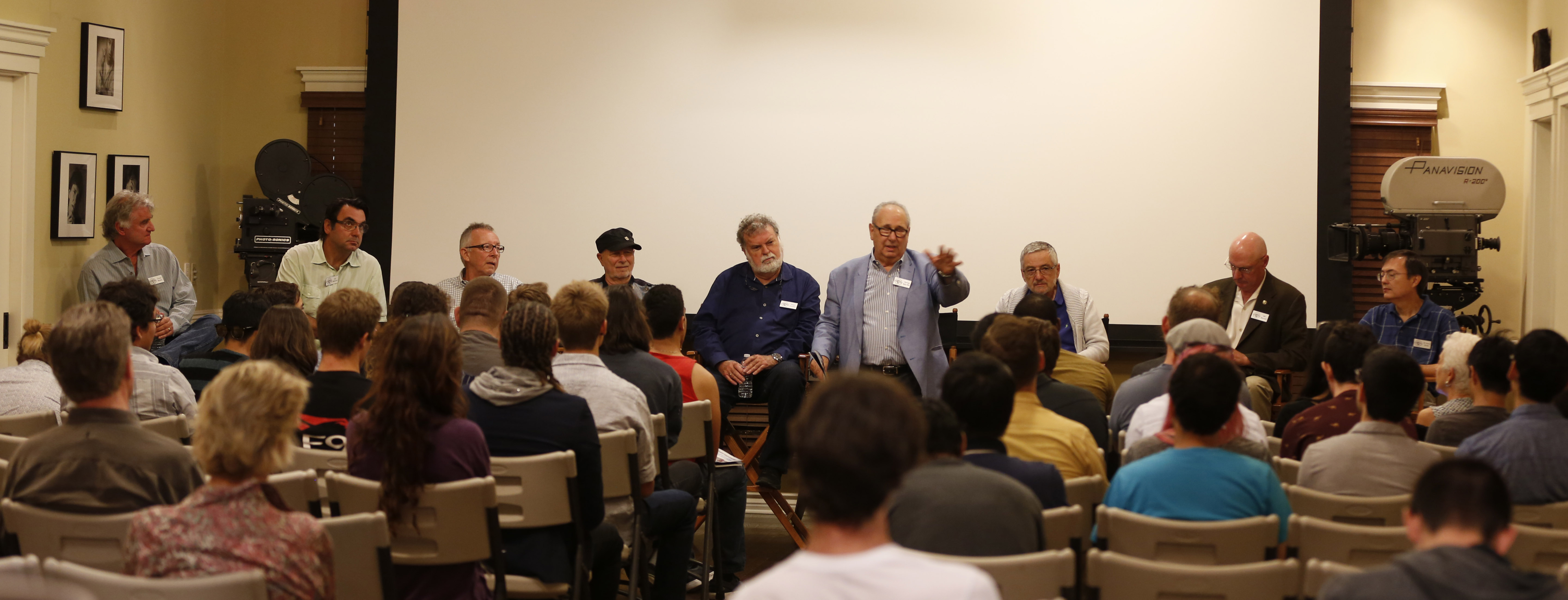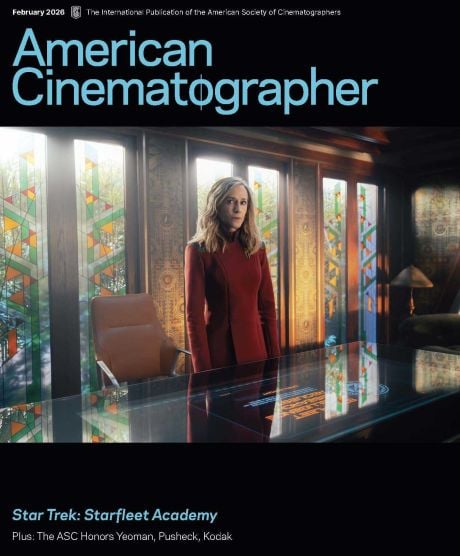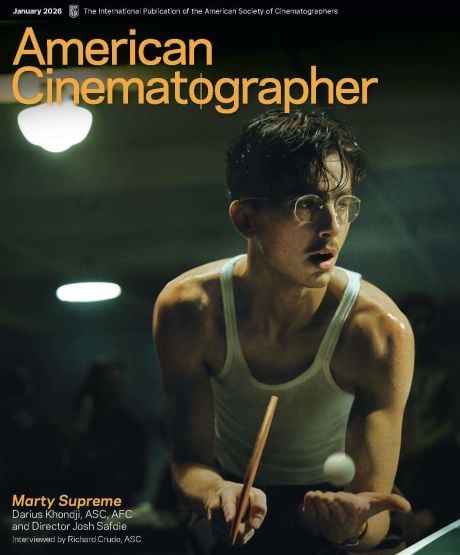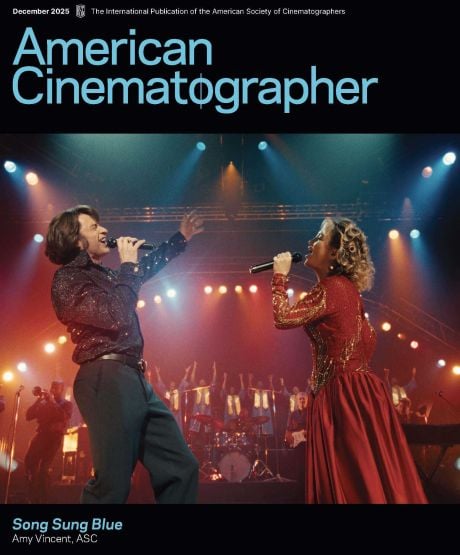
What to Expect from Directors, Protecting Creative Intent, and Landing That 1st Job
“There is one skill I really admire in a director: the ability to see the movie in your mind. Directors should be able to do that.”

“In 1919, a few cinematographers got together after a day’s work in Hollywood in a room they called ‘the club,’” George Spiro Dibie, ASC, told a recent gathering of students at the Clubhouse. “They exchanged ideas and shared information. And today, 96 years later, ASC members are sharing their experiences with you.”
Also volunteering their time to answer questions from the emerging filmmakers at the Oct. 22 event were ASC cinematographers Bill Bennett, Dean Cundey, Fred Goodich, Suki Medencevic, Charles Minsky, Peter Moss, M. David Mullen and Robert Primes. Dibie leads the ASC's outreach efforts. The students hailed from California State University-Northridge, California State University-Fullerton and San Diego State University.
The first question was a request for advice on how to begin a career in cinematography.
“The people you know in your class will be your base, so keep in touch with them,” Minsky advised. “Also, hang out in rental houses. Donate your time and try to learn as much as you can.”
Mullen noted that his first jobs came from a connection he made in film school, and then his career just snowballed. Medencevic concurred, adding, “I still work with classmates from years ago.”
Cundey offered two pieces of advice: “First, never turn down a job of any kind. Even if you work as a grip or electrician, you’ll learn something of value. Second, never ask how much you’re going to make. You don’t want to be seen as the person taking the job because you want the money; you’re taking it to make that director’s job as good as possible.
“Then,” Cundey concluded, “network from that job, shoot anything for free, and make a reel out of it.”
“All our crew, if they are ambitious, are constantly looking to move up, so we’re always looking for people at the bottom to start coming up,” said Bennett, who was recently named this year's ASC Presidents Award honoree. “You never know when your moment will be.”
Primes added, “And don’t get discouraged. Just steel yourself and know that it’s really competitive.”
Many panelists identified a positive attitude as absolutely crucial. “On set, you’d better have a great attitude,” said Dibie. “If you don’t, you won’t be there the next day.” Moss agreed, adding, “I was always the first person on the set and always smiling.”
Equally important, said Goodich, are “the abilities to communicate with others and play a role in a team.”
Asked how a cinematographer might best protect the integrity of his or her images, the panelists noted that this has become increasingly difficult with the proliferation of digital postproduction technologies. “This is a complex topic,” said Goodich. “Today’s images go through many stages where [your creative intent] can be compromised.”
“Do as much as possible in front of the lens to create the look you hope to maintain,” Cundey advised.
Echoing that, Bennett suggested that the best way to safeguard creative intent is “to make sure your dailies look a lot like the finished product. The editor and director will work with the dailies for months and get used to what they look like, and once they do, they will resist change mightily.” He shared with the students how his fellow ASC member Russell Carpenter manages color on each project: “Russ takes stills on set, colors them to suggest what he and the director intend for the look, and puts them into three books — one for himself, another for the editor, and the third for the colorist. If he sees a change from that look, he’ll call everyone up and say, ‘Look at page 36, frame 3.’”
Mullen pointed out, “If you don’t own the image, ultimately you don’t control the image. Cinematographers are hired to create the image, so our ideas are respected to a degree, but there will be variations of control [on each project].”
Still, said Primes, “As an artist, it’s your duty to do everything you can to protect your images. I think everyone sitting here with me has gone to extraordinary lengths to do that.”
Dibie noted that establishing a good rapport with the production company, as well as the director, will help. “Relationships are very important,” he emphasized, “and if you have good relationships with them, they will be more inclined to listen to you and let you supervise what’s happening in post.”
One student asked whether learning to shoot film is still relevant, given that is used on so few motion-picture productions today. Mullen called shooting film “an enriching experience” for those who are interested in film history, like he is, “but for the nuts-and-bolts of learning to be a cinematographer, learning film specifically is less critical.” He added, “Film gave me a discipline that I have maintained in my digital work, but I think a cinematographer working in an all-digital environment can learn to be equally disciplined.”
Medencevic noted that when he works with students who are shooting 35mm film for the first time, “often they initially resist because it looks so complex, but once they overcome the technology shock, they fall in love with it. The first experiences of exposing film [are like] magic. I think it does make you a better cinematographer because it enables you to see how whatever you do with light in front of the lens will transform the image.”
Several panelists echoed Mullen’s point that shooting film taught them a discipline that has been invaluable in the digital world, and they also noted that the money saved up front by shooting digitally is frequently matched — and often exceeded — by what is spent in postproduction when massive amounts of data are delivered. “With digital, the director often says, ‘Just let it roll,’ and that creates a [huge amount] of data,” Bennett said. “Somewhere in that 22 minutes is the 18 seconds the director wanted.”
Cundey urged the students to “learn about technology, but don’t let it outsmart you. You can get cameras that do the exposure and focus for you, but forget all that automatic stuff. You have to walk in and ask, ‘What should the audience see in this scene?’ It’s about knowing the science and understanding how to apply it artistically.”
Another student asked how much a cinematographer should expect a director to know about cinematography. “There are many types of directors,” said Mullen. “Some are passionate about images, and others are passionate about performances or other aspects of the process. They all have their interests, strengths and weaknesses, so it’s hard to generalize.”
Minsky said he expects the director to know what the story is about, and how each scene relates to the others. “As a cinematographer, I can offer different suggestions for how to achieve what the director wants, but I can’t tell the director what the story is about; he or she has to know that. I’ve had good experiences with directors who didn’t know anything about lenses; they knew the story and understood what each scene was about.”
Cundey added, “There is one skill I really admire in a director: the ability to see the movie in your mind. Directors should be able to do that.”
Primes said he looks for two seemingly contradictory things in a director: “The director should truly, deeply understand the story, the mood and how the viewers’ emotions will be touched; and the director should also be open minded to suggestions from his or her collaborators. To just do it your way is to forfeit the genius of all the other people working with you.”
Medencevic emphasized that establishing trust with the director, the actors and other key collaborators “is the most valuable thing you can do — it’s key to the creative process.”
“Learn to understand people,” Cundey advised. “Before you speak, stop and ask yourself whether what you’re about to say will be helpful or offensive.”
Bennett added, “A producer once told me something I wished I’d learned earlier: ‘Never pass up the opportunity to keep your mouth shut. No one will remember what you didn’t say.’”






